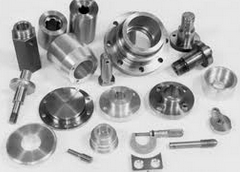

Inquiry

Project Review

Machining

Quality Control

Pass/Fail

Delivery
In today's advanced manufacturing landscape, the demand for miniaturized, high-precision components continues to rise. From medical implants and microelectronics to aerospace sensors and precision instruments, small metal parts are at the heart of countless technologies. However, producing these tiny yet complex components presents unique technical challenges. To meet such demands, manufacturers are turning to new innovations in machining small metal parts that combine precision, speed, and efficiency.

1. The Growing Demand for Small Metal Components
Miniaturization is a driving force across many industries. Modern products are getting smaller, lighter, and more efficient—yet they must still meet stringent performance and safety standards. This has increased the need for micron-level precision machining that can handle delicate materials and intricate geometries while maintaining exceptional accuracy and consistency.
Industries such as medical devices, aerospace, automotive, electronics, and robotics all rely heavily on high-quality small metal parts that function flawlessly in tight assemblies.
2. Key Challenges in Machining Small Metal Parts
Producing miniature components may appear similar to standard machining, but it introduces several complex challenges that require specialized expertise and equipment:
a. Maintaining Tight Tolerances
Small parts often require tolerances within microns. Even the slightest vibration, temperature change, or tool deflection can lead to dimensional errors. Achieving this level of precision demands stable machines, advanced CNC control systems, and precise calibration.
b. Tool Wear and Breakage
The cutting tools used for machining small metal parts are typically very fine, making them susceptible to wear or breakage. Tool selection, coating, and speed optimization are crucial to maintaining performance and reducing downtime.
c. Heat Management
In micro machining, even a minimal amount of heat can distort small parts or affect material properties. Manufacturers must use efficient cooling systems and optimized cutting strategies to prevent thermal deformation.
d. Workholding and Fixturing
Securing small components during machining without damaging or distorting them is a major challenge. Advanced fixturing systems, vacuum chucks, and micro-grippers are essential for stability and repeatability.
e. Surface Finish and Burr Removal
Tiny parts often require exceptionally smooth surfaces, especially in medical and optical applications. Post-processing steps like deburring and polishing are more complex at small scales, demanding precision finishing techniques.
3. Innovations Transforming Small Part Machining
As technology evolves, manufacturers are adopting new methods and tools to overcome these challenges and push precision machining to new limits:
a. Advanced CNC Micromachining
Modern CNC systems offer nanometer-level positioning accuracy, enabling precise cutting of miniature features. High-speed spindles, real-time monitoring, and adaptive control improve quality and reduce human error.
b. Multi-Axis Machining
5-axis CNC machines allow complex geometries to be machined in a single setup, improving accuracy and reducing handling errors. This is especially beneficial for small parts that require multiple angles or intricate designs.
c. Micro EDM and Laser Machining
Electrical Discharge Machining (EDM) and laser machining can produce features too small or delicate for traditional tools. These non-contact methods are ideal for hard-to-machine metals or ultra-fine detail work.
d. Automation and Robotics
Automation helps stabilize production quality and efficiency. Robotic handling systems can load, unload, and inspect small parts with minimal human intervention, reducing contamination and improving throughput.
e. Digital Quality Control
High-resolution microscopes, optical scanners, and coordinate measuring machines (CMMs) now verify part accuracy at microscopic scales, ensuring that every detail meets strict design specifications.
4. Applications Across Industries
The ability to machine small metal parts with precision is vital across several high-technology fields:
Medical Devices: Surgical tools, implants, and microfluidic components.
Aerospace: Micro-valves, sensors, and fuel system parts.
Electronics: Connectors, terminals, and precision housings.
Automotive: Miniature engine parts, injectors, and actuators.
Defense and Optics: Guidance components and micro-lens housings.
Each of these industries depends on machining innovation to balance miniaturization with reliability.
5. The Future of Small Part Machining
Looking ahead, smart manufacturing and AI-driven process optimization are set to redefine precision machining. Predictive analytics can anticipate tool wear, while digital twins simulate machining performance before production begins. As additive manufacturing and hybrid systems evolve, the integration of 3D printing and CNC micromachining will also unlock new design possibilities for ultra-small components.
Machining small metal parts is both an art and a science—requiring deep technical expertise, cutting-edge equipment, and a commitment to precision. While the challenges are significant, continuous innovation in micro machining technologies is enabling manufacturers to meet the growing demand for miniaturized, high-performance components.
By embracing these advancements, companies can stay ahead in the race toward smaller, smarter, and more efficient products—proving that even the tiniest parts can make the biggest difference in modern manufacturing.
About AJL Machining:
AJL Machining is a professional and industry-leading one-stop workshop for custom metal parts services. We have our own factory and a reliable network of partners that enable us to cater to your requirements ranging from prototypes to large-scale production. Our competitive edge is our ability to ensure that all of your parts are produced according to specifications, within budget, and delivered on time to meet your evolving demands. Presently, we serve over 80% of our business to multinational corporations in China, as well as overseas customers.
To learn more, please don't hesitate to contact us via email at sales@ajlmachining.com, or visit our website at www.ajlmachining.com

AJL Machining is a professional and industry-leading one-stop shop for custom metal parts services. We have our own factory and a reliable network of partners that enable us to cater to your requirements ranging from prototypes to large-scale production.
Add: No 58, Chenghu Road, Kunshan, Suzhou City, Jiangsu Province, China 215333
Email:sales@ajlmachining.com
Tel: +8613522650203